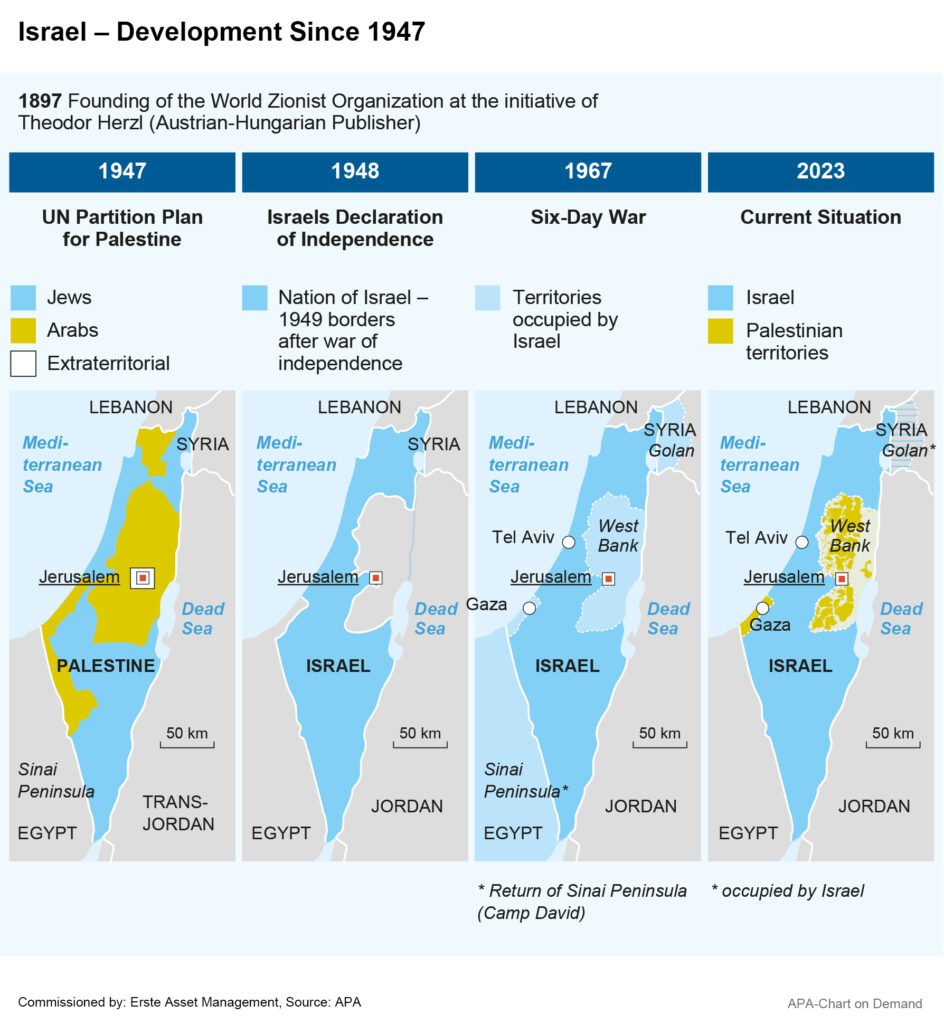
Roughly two weeks after the surprising terrorist attacks by the radical Islamic Hamas ruling the Gaza Strip, on targets in Israel, the military conflict in the country continues unabated. The war in the region also continues to dominate the financial and commodity markets, with global concerns that the conflict could possibly spread to other countries in the Middle East being the main driver of uncertainty.
Gold and Oil Prices Rising
Gold price has risen significantly since the outbreak of the crisis. The price of the precious metal, considered a safe investment in times of crisis, recently reached 1,980 USD per troy ounce (Scource: LSEG Datastream) and is approaching the 2,000 dollar mark.
Crude oil prices also increased, but have recently pulled back somewhat. Just before the outbreak of the crisis, the price of a barrel (159 liters) of the benchmark oil grade Brent crude was just under 85 USD, intermittently rising to not quite 94 USD in recent weeks. on Tuesday morning, prices for Brent held at just above 90 USD (Source: LSEG Datastream).
Please note that investments in securities entail risks in addition to the opportunities.
The oil price is probably the most important channel of impact between the conflict and the global economy, as Erste AM Chief Economist Gerhard Winzer comments. A fast and strong price increase would represent a price shock. This would reduce the purchasing power of consumers and companies, stop the falling inflation trend and increase the pressure on central banks to raise key interest rates further. Economic sentiment would also suffer. All these factors would increase the probability of a recession.
Israeli Ground Offensive Could Be Imminent
Israel’s army has bombed hundreds of targets in the Gaza Strip since the Hamas attack on 7 October, and the Israeli military’s announced ground offensive in the area is expected to commence shorty. Against this backdrop, Israel massively stepped up airstrikes on the Gaza Strip on Sunday night, with Hamas reporting at least 80 dead after the attacks.
Israel’s Defense Minister Yoav Galant anticipates fighting that could last for months. “It may take a month, two or three, but in the end there will be no Hamas,” Galant said on Sunday. Before Hamas meets Israeli forces on the ground, “the enemy” will first face air strikes, he said, adding that the next stage will “come soon,”. The Israeli strategy is to weaken Hamas in preparation for the next phase of the military operation, Lt. Col. Jonathan Conricus told US Fox TV.
Attacks from Lebanon on Israel have also increased since the outset of the war between Israel and Hamas. There is concern that the Iran-backed Shiite organization Hezbollah could further intensify its attacks on Israel. Hezbollah is considered far more powerful than Hamas. The Israeli army accuses the Hamas-allied group of trying to drag Lebanon into a war.

US Prepares for Possible Expansion of Conflict
The US also fears a possible expansion of the conflict in the Middle East. “We are concerned about a possible escalation,” US Defense Secretary Lloyd Austin told ABC television on Sunday. In the last few days, several drone attacks were carried out or attempted on US military bases in Syria and Iraq, according to Pentagon data. The US therefore wants to increase its military presence in the Middle East to protect its own units and send a deterrent message. Austin announced on the weekend that more assets would be moved to the eastern Mediterranean. Previously, the US had moved several warships to the eastern Mediterranean as a deterrent.
US Secretary of State Antony Blinken also expressed alarm. “We are concerned,” Blinken told NBC on Sunday. “We’re taking steps to make sure we can effectively defend our people and respond decisively when we need to.” At the same time, he stressed that the US does not want the conflict to escalate. “We don’t want a second or third front to develop,” Biden stressed. “That’s in nobody’s interest, and that’s exactly why we’ve sent a very strong message to try to deter Hezbollah and more directly also deter Iran from opening a second front.”
Diplomatic Efforts Continue
But efforts to contain the conflict diplomatically are also in full swing, albeit unsuccessful for now. Leaders from around the world called for a cease-fire between Israel and Hamas at a Middle East summit in Cairo over the weekend. This should allow, among other things, “massive” humanitarian aid for the suffering civilian population in the Gaza Strip, UN Secretary-General António Guterres demanded in Cairo on Saturday. Meanwhile, in the Palestinian territory, the first trucks with relief supplies arrived after days of waiting. But “much more” aid is required for the 2.4 million residents of the Palestinian territory, Guterres said. Jordan’s King Abdullah II, whose country like summit host Egypt has been a mediator in the Middle East conflict for decades, also called for an “immediate cease-fire.”
There was no hope for an easing of tensions at the conference, however, partly because Israel was not invited. The summit was also attended by EU Council President Charles Michel and heads of government or foreign ministers of several European countries. Representatives of the United States, Russia, China, Japan and Canada were also present.
Last week, a Brazilian draft resolution on the crisis, which focused on humanitarian aid, was vetoed by the United States in the UN Security Council. The United States has now submitted its own draft to the Security Council. According to diplomatic sources on Sunday, the resolution is primarily concerned with the release of hostages kidnapped by Hamas in the Gaza Strip. It was initially unclear whether and if so, when, the resolution could be submitted to the Council for a vote. Either way, a veto by Russia is considered likely.
Central Bankers and Economists Concerned about Possible Economic Consequences
Economists and central bankers recently warned of the possible economic impact the crisis in the Middle East could have. The conflict could pose challenges to the euro area economy, Greece’s central bank chief Yannis Stournaras said. “Given the fact that the euro area remains a large net energy importer, this is likely to have a stagflationary impact if it becomes a problem,” the ECB Governing Council member told the Financial Times last week.
An accumulation of negative supply shocks (supply chains, gas price, oil price,…) would lead to an increase in long-term inflation expectations, writes chief economist Gerhard Winzer. On the part of central banks, it would probably take an even more restrictive monetary policy, i.e. significantly higher key interest rates, to reduce inflation.

“The escalation in the conflict between Hamas and Israel underlines once again that the quiet geopolitical times are over.”
Gerhard Winzer
Chief Economist Erste Asset Management
The Ifo Institute also sees possible negative consequences for the German economy. “German industry is already affected by the rather weakening global industrial economy anyway,” Ifo President Clemens Fuest told Reuters news agency in Berlin in mid-October. At present, the impact may still remain limited, Fuest said. However, this is likely to change if the US or Iran intervene in the conflict.
According to Winzer, the escalation in the conflict between Hamas and Israel underlines once again that the quiet geopolitical times are over. More frequent and stronger fluctuations in economic growth and inflation could be the result. In theory, this means an increase in risk premiums on the markets, both for equities and bonds.
For a glossary of technical terms, please visit this link: Fund Glossary | Erste Asset Management
Legal note:
Prognoses are no reliable indicator for future performance.

